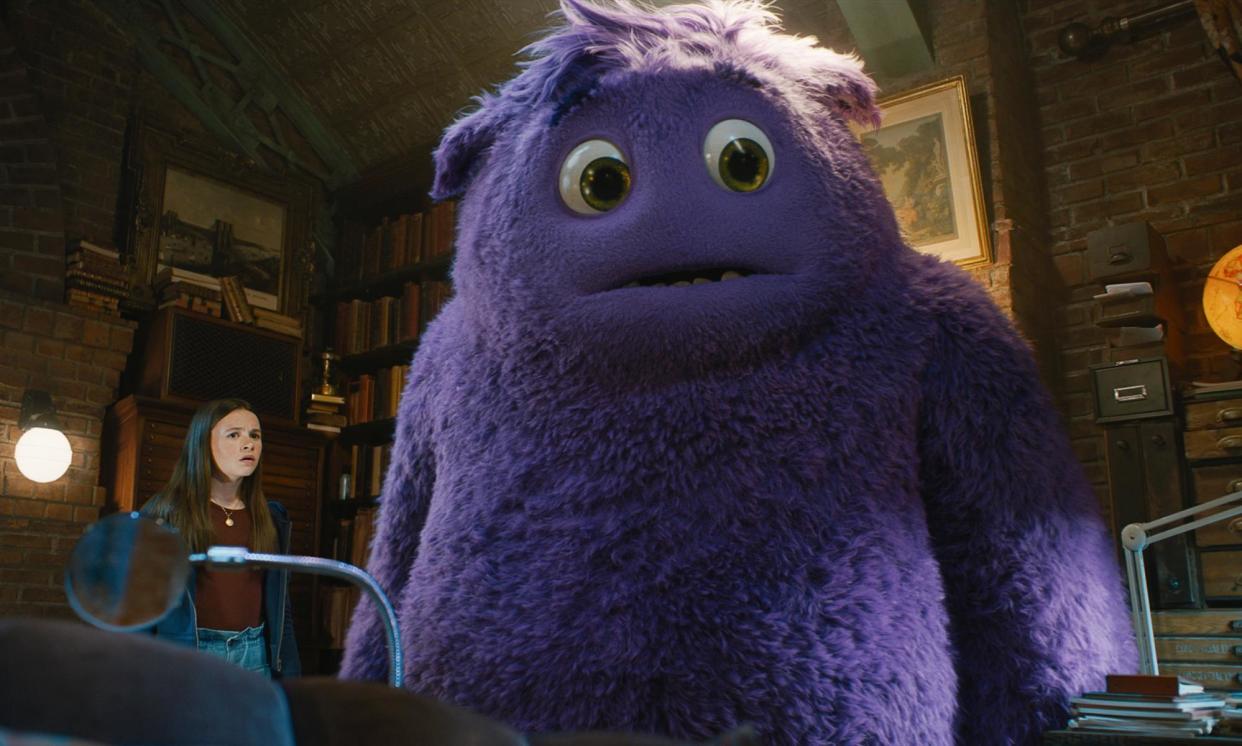IF review – imaginary friends reunited in a kid-pleasing live-action fantasy

What if imaginary friends didn’t vanish into the murk of forgotten memories as soon as the child who conjured them grew up? What if the invisible bestie lingered on, trying hard not to be wounded by the rejection and waiting in vain to be of use once more? If that sounds familiar, that’s because it is. The central premise of American actor-director John Krasinski’s IF – his first family film after the horror movie double of A Quiet Place and its sequel – is borrowed from several Pixar films.
There’s an obvious parallel with the subplot of Bing Bong in Inside Out. A heartbreakingly cheerful pink cat/elephant/dolphin mashup in a too-small top hat, Bing Bong is the long-discarded imaginary friend who still lurks in the subconscious of Riley, and who’ll do anything, even sacrifice himself, for the girl who dreamed him into existence. But there’s also an almost too close for comfort overlap with Toy Story, and the idea of an intensity in a child’s imagination that is potent enough to breathe life into inanimate objects, and of the bruising transience of the period in infancy in which disbelief is fully suspended and magic is real.
It’s fair to say that the quality of the screenplay in this live-action picture (Krasinski wrote it as well as directing and starring) is not in Pixar’s league. In fact, it’s not even in the same imaginary universe. But IF has a couple of things going for it. First, there’s a heartfelt sweetness that stops short of saccharine overkill and allows the film to negotiate darker themes – IF deals with bereavement and childhood anxiety – with sensitivity. Mainly, though, the film rests on the shoulders of The Walking Dead’s Cailey Fleming, an actor who shows range and an unexpected emotional heft in the central role of the 12-year-old Bea.
Seeking something to distract her from her dad’s illness, Bea recaptures the childhood that she was in danger of losing
An introductory home-video montage of Bea’s early life sets the scene: it looks like a blissful childhood, full of surprises and silliness, with Dad (Krasinski), Mom (Catharine Daddario) and the younger Bea (Audrey Hoffman) cavorting in wigs and singing along to Tina Turner songs. But as the sequence unfolds, the spark goes out of Mom’s eyes, her hair is replaced by a turban and, finally, the montage ends with a symbolically closed door. Well, I never claimed it was subtle.
Fast-forward and the film rejoins tweenage Bea, mature beyond her years and once again staying with her daffy, scatterbrained granny (Fiona Shaw) in her New York apartment while a parent languishes in hospital. This time, it’s her father. He’s at pains to explain that his ailment (a heart defect – literally, a broken heart; again, not subtle) can be fixed by a simple operation. But grief over the loss of her mother means that Bea can’t let go of the fear that she might also find herself without her father.
It’s at this point that she encounters the inhabitants of the apartment upstairs. Blossom (voiced by Phoebe Waller-Bridge) is like an insectoid Betty Boop with antennae and a British accent; croissant-loving Blue (Steve Carell) is actually purple and is a fur-covered goofball the size of an entry-level SUV. Once Bea has stopped hyperventilating, she learns that they are forgotten imaginary friends and, like many others of various shapes and sizes, are looking for a new child. Reluctantly helping them in this endeavour is Cal (Ryan Reynolds), an adult human male who has somehow found himself lumbered with an assortment of imaginary friends and their all too real existential crises and rejection anxieties.
Seeking something to distract her from her dad’s illness, Bea offers to help – a decision that allows her to reignite her own imagination and recapture the childhood she was in danger of losing. The picture hits its stride, after an uncertain first act, once Bea and her new friends visit the Coney Island-based retirement home of the IFs, as they like to call themselves. There’s an endearing daftness to some of the jokes. An imaginary glass of iced water who had hoped that he had a metaphorical meaning ruefully admits that the kid who dreamed him up was just really thirsty. And a makeover montage of the retirement home allows Bea’s imagination (and the CGI team) to run riot.
This is not an instant family classic. It’s more than possible that, like its imaginary menagerie of creatures, the film is destined to fade from memory and disappear. But IF is an engaging kid-pleaser that celebrates the power of imagination and suggests that the key to overcoming the tough times might have been lurking in our minds all along.
In UK and Irish cinemas now

 Yahoo Movies
Yahoo Movies 
